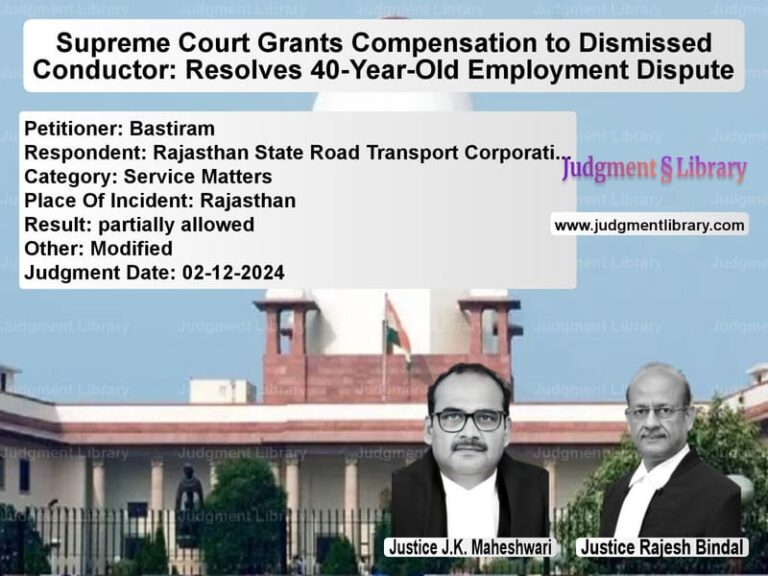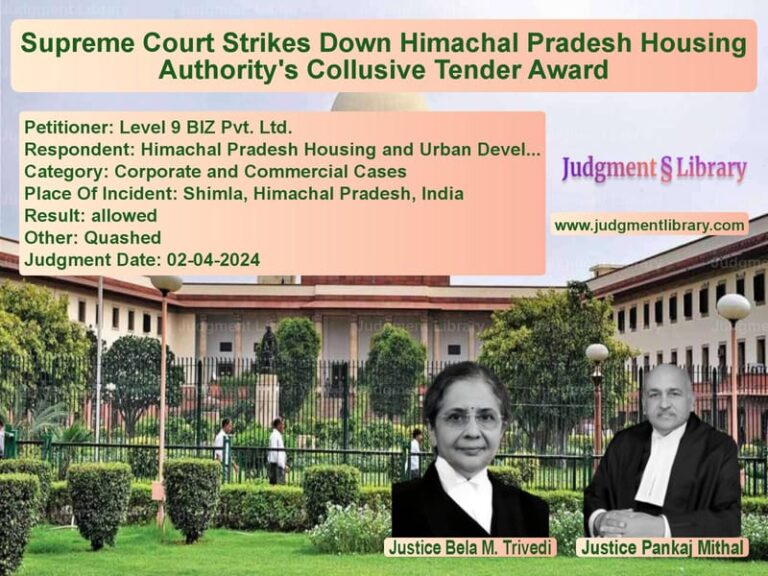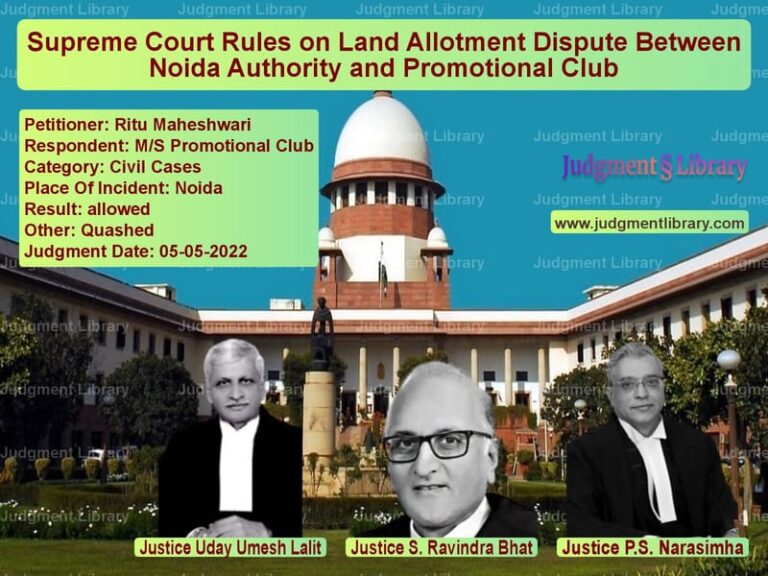Consumer Rights and Welfare Schemes: Supreme Court’s Ruling on Construction Workers’ Benefits
The Supreme Court of India, in its ruling on The Joint Labour Commissioner and Registering Officer & Anr v. Kesar Lal, addressed an important legal issue regarding the status of construction workers who are beneficiaries of statutory welfare schemes. The primary question before the Court was whether a construction worker, registered under the Building and Other Construction Workers’ (Regulation of Employment and Conditions of Service) Act, 1996, and availing benefits under welfare schemes, qualifies as a ‘consumer’ under Section 2(d) of the Consumer Protection Act, 1986.
The ruling carries significant implications for the rights of workers under statutory schemes and their ability to seek redress for deficiencies in service provided by government welfare boards. The Supreme Court’s decision clarified the scope of consumer rights and emphasized the accountability of welfare boards in ensuring the timely and proper delivery of benefits to registered beneficiaries.
Background of the Case
The respondent, Kesar Lal, was a registered construction worker under the Rajasthan Building and Other Construction Workers Welfare Board. The Board had formulated various welfare schemes, including one that provided financial assistance of Rs 51,000 on the occasion of a beneficiary’s daughter’s marriage. Kesar Lal, having obtained a Labour Beneficiary Identity Card, applied for this assistance before the scheduled date of his daughter’s marriage.
However, his application, along with those of 326 other workers, was rejected on technical grounds, citing incomplete forms, missing affidavits, or incorrect documents. Dissatisfied with the rejection, he filed a consumer complaint before the District Consumer Disputes Redressal Forum, which was dismissed. The State Consumer Disputes Redressal Commission later overturned this decision, ruling in favor of Kesar Lal and ordering the Welfare Board to pay Rs 51,000 along with compensation and interest.
The National Consumer Disputes Redressal Commission upheld the ruling, reducing the interest rate from 18% to 9% per annum. The Welfare Board then appealed to the Supreme Court, arguing that a registered worker availing benefits under a statutory scheme is not a ‘consumer’ and cannot seek relief under the Consumer Protection Act.
Petitioners’ Arguments
The appellants, the Joint Labour Commissioner and Registering Officer, made the following key arguments:
- The welfare schemes are funded primarily by the cess collected from employers and not from contributions by workers, making them state-driven initiatives rather than consumer services.
- The nominal contribution paid by construction workers for registration and membership does not constitute ‘consideration’ as required under the Consumer Protection Act.
- Welfare benefits are part of the government’s sovereign function and cannot be equated with commercial services covered under consumer protection laws.
- Precedents such as Bihar School Examination Board v. Suresh Prasad Sinha were cited to argue that beneficiaries of welfare measures cannot be classified as ‘consumers.’
Respondent’s Arguments
On behalf of the respondent, the following counterarguments were made:
- The Welfare Board provides services to registered workers in exchange for their contributions, thereby establishing a consumer-service provider relationship.
- The rejection of applications on trivial procedural grounds amounted to a ‘deficiency in service,’ warranting redress under the Consumer Protection Act.
- Legal precedents, such as Shiv Kumar Joshi v. Regional Provident Fund Commissioner, establish that statutory services provided in return for contributions can be subject to consumer protection laws.
- The arbitrary rejection of benefits deprived workers of their entitlements, necessitating judicial intervention to uphold their rights.
Supreme Court’s Ruling
The Supreme Court rejected the appellants’ arguments and held that registered construction workers are ‘consumers’ under the Consumer Protection Act, 1986. The Court emphasized that:
“The services which are rendered by the Board to the beneficiaries are not services which are provided free of charge so as to constitute an exclusion from the statutory definition contained in Section 2(1)(o) and Section 2(d)(ii) of the Consumer Protection Act, 1986.”
The Court further observed:
- Registered workers make contributions to the welfare fund, thereby fulfilling the requirement of ‘consideration’ under the Consumer Protection Act.
- The Board is a statutory corporate body capable of being sued, making it accountable for deficiencies in service.
- The rejection of claims on technical grounds without due consideration was arbitrary and unjustified.
- Consumer protection laws are designed to provide an accessible and efficient remedy for grievances, and workers should not be forced to seek relief through complex litigation.
Legal Precedents Considered
The Court referenced several past rulings that reinforced its decision, including:
- Lucknow Development Authority v. M.K. Gupta: Established that public authorities providing services are accountable under consumer law.
- Shiv Kumar Joshi v. Regional Provident Fund Commissioner: Held that beneficiaries of statutory schemes are entitled to consumer protection.
- Punjab Urban Planning and Development Authority v. Vidya Chetal: Affirmed that statutory obligations involving service provision are subject to consumer laws.
- Canara Bank v. United India Insurance Co.: Held that even non-contractual beneficiaries can be ‘consumers’ under the Act.
Implications of the Judgment
This ruling sets a significant precedent by affirming the accountability of welfare boards and other government agencies administering statutory benefits. The decision ensures that construction workers and other beneficiaries of similar schemes have an effective legal remedy if they face arbitrary rejection or delays in receiving benefits.
The judgment also clarifies that the provision of services by a statutory welfare board in exchange for contributions constitutes a valid consumer-service relationship. By expanding the scope of consumer protection, the ruling reinforces the principles of transparency, accountability, and justice in welfare administration.
Conclusion
The Supreme Court’s decision in this case is a landmark ruling in favor of workers’ rights, ensuring that beneficiaries of welfare schemes are not left without remedies against arbitrary actions. It upholds the principle that statutory service providers must be held accountable for deficiencies in service, reaffirming the importance of consumer protection in the realm of welfare administration.
Petitioner Name: The Joint Labour Commissioner and Registering Officer & Anr.Respondent Name: Kesar Lal.Judgment By: Justice Dhananjaya Y Chandrachud, Justice Ajay Rastogi.Place Of Incident: Rajasthan.Judgment Date: 17-03-2020.
Don’t miss out on the full details! Download the complete judgment in PDF format below and gain valuable insights instantly!
Download Judgment: The Joint Labour Com vs Kesar Lal Supreme Court of India Judgment Dated 17-03-2020.pdf
Direct Downlaod Judgment: Direct downlaod this Judgment
See all petitions in Consumer Rights
See all petitions in Employment Disputes
See all petitions in Public Sector Employees
See all petitions in Judgment by Dhananjaya Y Chandrachud
See all petitions in Judgment by Ajay Rastogi
See all petitions in dismissed
See all petitions in supreme court of India judgments March 2020
See all petitions in 2020 judgments
See all posts in Civil Cases Category
See all allowed petitions in Civil Cases Category
See all Dismissed petitions in Civil Cases Category
See all partially allowed petitions in Civil Cases Category







